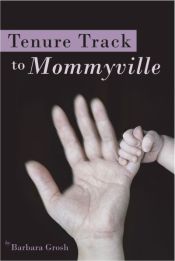buy the book at Lulu.com
discussion questions for book clubs
read Maureen Corrigan's speech at the award ceremony
read Anne Mulcahy's speech at the award ceremony
read Barbara Grosh's speech at the award ceremony
read the first chapter (pdf document)
Rochester Democrat & Chronicle coverage
Brighton-Pittsford Post coverage
Contact Barbara Grosh


Elaine Barlow has a bargain with her husband George: if she doesn’t find a new job by year’s end, he will choose their next move and re-establish his vet practice, which will probably spell the end of her career. Elaine used to be a high-flyer. She got her PhD, traveled all over Africa on a string of prestigious research fellowships, and landed a top-notch university teaching job. But she failed at the game of academic politics, she didn’t get tenure, and now she can’t seem to find another job. She’s lost her paycheck, her social status and her self-esteem. Stripped of her professional identity, Elaine lives a life of errands with her preschool daughter Stella. She listens to former colleagues being interviewed on NPR, while she has become invisible. Elaine studies the people she meets to see how they do it—how they live without tenure. She begins to imagine herself as something else. Lawyer? Teacher? Wildlife rehabilitator? Convenience store clerk? Long days with the spirited Stella leave Elaine feeling like a double failure. George stays out late several nights a week, supposedly working long hours at the job he hates. Can Elaine pull herself together before her marriage collapses too?
Finally, Elaine gets a chance at another academic job, but George refuses to relocate for it. He obviously has a secret, and Elaine fears the worst. But Elaine has been learning—from a manicurist, a flooring salesman, her former students, her parents, Stella, and their menagerie of special needs pets. She learns that it’s never too late to grow into a person you respect. And when that happens, anything is possible.
The Culture wars
Maureen Corrigan's remarks at the Xerox Aspiring Author award ceremony
Welcome everyone. I’m delighted to have been asked to serve as a judge in the Xerox Aspiring Authors Contest and also to speak today about the implications of self-publishing for our literary culture.
I’m a book critic and a literature professor; thus, I’m one of literary culture’s traditional gatekeepers. At my office at Georgetown and at my home, I receive about 75 new books a week, sent by publishers in the hopes that I’ll (favorably) review their books. How do I make critical evaluations about whether a book is worthy of a review or not—especially a book by a first-time author? Well, first, there’s what we call in the book critic business, the touch test. If you run your hands over a book jacket and feel embossed bosoms on the cover, then chances are good that book probably isn’t going to get a review, at least not on NPR. Next I read. If a book doesn’t grab me within the first 10 pages of so because of its distinctiveness of voice, of scene, of situation, then I’ll most likely put it aside. The fortunate few—about 60 books a year—will get a review on Fresh Air. But it’s an open question as to whether or not people like me—highly educated, and opinionated—should be making such judgments in the first place about which books get attention in the literary marketplace.
In fact, since the birth of the Republic, Americans have bitterly quarreled over culture and who gets to define what is a “worthwhile” work of art. The country’s democratic ethos has always been pitted against an evolving meritocracy that demanded that the best, not merely the luckiest or the wealthiest, triumph in every field. Americans have long been asking themselves: Who should decide what culture is and what’s good and what isn’t? Should the judges be wealthy philanthropists who financially support the arts, university trained eggheads (like me), or the voice of the untutored citizenry at large? Does popular entertainment, unsanctioned by elites, somehow damage the behavior and character of the uneducated working masses and the minds of unformed youth—whether it be the dime novels of the 19 th century, the movies of the early 20 th century, television 50 years later, or the video games of our own time.
In 1849, in New York, this quarrel over culture turned deadly. Two actors were giving overlapping performances at separate theaters which reflected the sharp divisions between the city’s wealthy supporters of high culture and its working class majority who favored more popular forms of entertainment. The opulent Astor Place Opera House, had opened two years earlier as a palace for the city’s aristocracy to enjoy the sight of each other in their finest evening wear. In May of 1849, the Opera House hosted the celebrated British Shakespearean actor William Charles Macready in a production of Macbeth. Macready was a precise, intellectual actor whose restrained style appealed to New York’s cultural elite.
Meanwhile, uptown, the American actor, Edwin Forrester appeared as Spartacus in the The Gladiator. Forrester’s acting technique was much different than Macready’s: he was boisterous, extravagant, and larger than life on stage. The simultaneous performances became fodder for the city’s penny press—the cheap newspapers of the day--which saw the two men as symbols of their respective nations. The press also represented Macready as the embodiment of high art and Forrester as the epitome of vulgar entertainment. The press ginned up personal hostility between the actors, alleging that Forrester had booed Macready in a performance in England years earlier, and that Macready had criticized Forrester’s acting technique.
When the dual theatrical runs began in early May, Macready had the support of the upper classes, but Forrester had the affection of the far more numerous working masses, particularly thousands of belligerent young men know as “b’hoys.” On May 8 th, b’hoys infiltrated the Astor Place Opera House and so loudly disrupted Macready’s performance that his company was forced to stop its performance.
Over the next several days, tensions escalated. On May 10 th, the young thugs controlled enough seats in the Opera House to again disrupt Macready’s performance, but a large influx of police booted them from the hall. However, this ejection served to only enrage a crowd of some 10,000 milling around the Opera House who began pelting it with bricks and stones, while chanting slogans. Macready raced through his performance as his wealthy supporters in the audience cheered. Merging in with the crowd of theatergoers, Macready slipped back to his hotel room unharmed. But, by this time, the police had called in the local militia. After firing one warning shot, which failed to disperse the hostile crowd, the militia fired into crowd. Then, when the crowd surged toward the theater, the militia fired into it again. Twenty two people died, and more than 100 were wounded. They had given their lives, as the cultural historian Neal Gabler put it, “for the right to assert their own cultural authority.”
More recently, we have seen pitched, if fortunately, not lethal cultural battles between secular and Christian, and liberal and conservative Americans about college curricula, the respective roles of religion and science in public policy, and the explicit depiction of sexuality in popular culture. Again the question is raised: Who decides what is a “worthy” cultural product? Conservatives wonder: Should these decisions be left to Hollywood executives? Music moguls? New York publishing houses? Leftwing college professors? Liberals note that Hollywood, the hip hop impresarios, and the publishing houses make no profits without millions of Americans buying their supposedly decadent movies, music, and books. And, for better or worse, millions of Evangelical Christians have made an end run around the mainstream producers of cultural merchandise by purchasing books like Rick Warren’s Purpose Driven Life and making it (and other such books) mega-sellers beyond the dreams of those mainstream publishers they ignore. The cultural conflict rages on.
The certainty with which cultural elites used to resist such incursions from those they deemed their intellectual inferiors can be encapsulated in the remarkable career of perhaps America’s greatest critic of the 20 th century, Edmund Wilson. Wilson, as discussed in a new biography and a recent essay in the New Yorker magazine, was both extraordinarily learned—he knew six languages and was working on Hungarian when he died—and extraordinarily certain of his opinions, whether of so-called high literature or more popular forms, almost all of which he despised. Thus this incomparably well-read man, who introduced Americans to the work of Proust and Joyce, didn’t even bother finishing George Eliot’s Middlemarch—perhaps the greatest English novel of the 19 th century--because it bored him. Wilson told Vladimir Nabokov that he had no use for Nabokov’s greatest work, “Lolita.” Wilson called detective fiction, a personal favorite of mine, “completely dead,” and, in the last week of his life, went to see a couple of movies, which, like most movies, he hated. All he wrote in his diary was, “bang, bang.” The supposedly “moronic” flicks Wilson suffered through were The French Connection and The Godfather.
Wilson died over 30 years ago, and the Olympian hauteur of his pronouncements—and the anticipation with which they were greeted—would seem impossible today. There is no individual or institution with the standing to issue the kind of cultural pronouncements that Wilson and other great mid-century critics like Dwight MacDonald and Alfred Kazin regularly did. And the culture is far too fragmented into dozens and dozens of social and intellectual demographics for any but a few of us at any one time to pay attention to certitudes of only one thinker, no matter how great.
Today, while the struggle for cultural authority continues, the scales have tipped to the popular forces over those of the elite. Poetry slams, reality TV—even if it's often more fake than real—and, of course, blogging represent an extraordinary desire by millions of people not just to passively consume culture, but create it themselves. Sometimes, people even avail themselves of new technology to paradoxically find a path to what they hope will be an equally new authenticity.
In that sense, the urge to write and produce one’s own novel is of a piece with these emerging democratic trends in our recurring culture wars. We can be certain, too, that cultural gatekeepers and elites will pass judgments on these novice writing efforts in a modest attempt to maintain something of Wilson’s standards—after all, that’s why I’m here. But this tug of war is itself a sign of a healthy and energetic culture—so I urge the writers to write, the critics to criticize, and the readers to read—let our American argument about culture continue—as they say, that’s why it’s a great country.